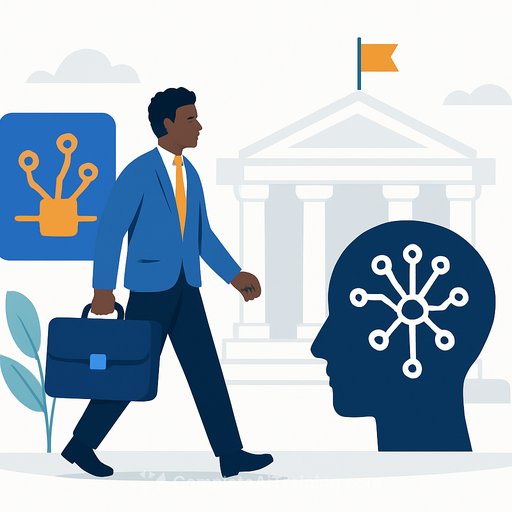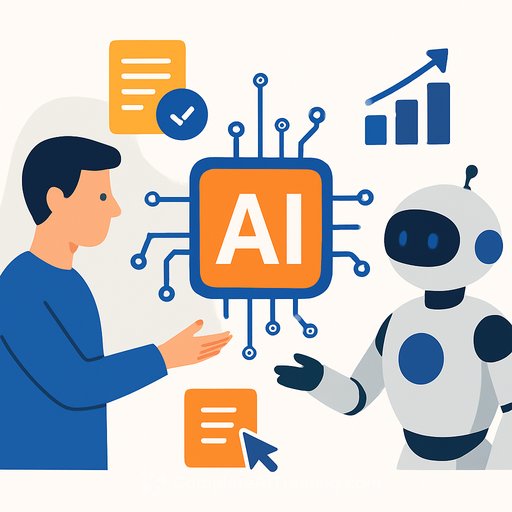AI Ministers Are Coming: What Government Professionals Need to Do Now
Sophia, the social humanoid robot, became the first AI to receive citizenship in 2017 and was later named a UNDP Innovation Champion. That was a headline. Now the headlines are shifting to something closer to your desk: AI stepping into ministerial roles.
Albania has appointed Diella-an AI-generated minister-to oversee public procurements and tackle corruption. It's a small sentence with big implications: algorithmic oversight in the core machinery of government.
Why this matters for government staff
AI isn't just automating paperwork. It's entering decision lanes that used to be exclusively human. Procurement. Case triage. Policy support. If your work touches compliance, budgets, or service delivery, your operating model is about to change.
The signal: Diella in Albania
Albania's prime minister authorized the creation of a virtual AI minister, Diella, to make public tenders "100 percent corruption-free" and transparent. The premise: an AI assistant can be immune to bribes, threats, and favoritism.
Diella ("sun" in Albanian) started as a digital assistant offering voice and text support. By September, it had helped deliver about 1,000 services and more than 36,600 documents, complete with digital stamps and an animated avatar in traditional Albanian dress. Now it's been elevated to supervise public procurements.
Precedents are stacking up
- AI faces are already on TV as anchors and in classrooms as teaching tools.
- China and Estonia have tested AI systems to help settle lower-level cases.
- In Nepal, youth activists reportedly used ChatGPT to help weigh interim prime minister options, including Sushila Karki.
The direction is clear: AI is moving from support roles to decision influence-and, in some cases, decision authority.
Why ministries will test AI leadership
- Corruption pressure: Where graft is a sticking point, AI is pitched as neutral and auditable.
- EU or reform deadlines: Accession goals and reform agendas drive visible anti-corruption steps.
- Capacity gaps: Procurement and service teams are overloaded; leaders want speed, consistency, and logs.
Hard questions your department must answer
- Legitimacy: Is an AI "minister" elected, appointed, or neither? What statute grants authority?
- Accountability: When the system errs, who is responsible-the vendor, the supervising minister, or the state?
- Bias and fairness: What data trained the model? Who audits outcomes across demographics and regions?
- Security: How are models protected from prompt injection, data exfiltration, and model poisoning?
- Procurement integrity: Can vendors influence the model's behavior post-award? Who controls updates?
- Due process: Is there a clear human appeal path for any AI-influenced decision?
A practical playbook for public servants
- Start with a mandate: Define the legal basis, scope, and limits of any AI role. Write it down. Publish it.
- Keep a human in the loop: Require human review on material decisions (awards, sanctions, eligibility).
- Set procurement guardrails: Update RFPs to require model cards, audit logs, versioning, and rollback plans.
- Build an audit spine: Log inputs, prompts, outputs, and decisions. Make them discoverable for oversight.
- Independent testing: Red-team models pre-deployment; repeat after each update. Document failure modes.
- Bias checks that matter: Test real cases from your jurisdiction, not just benchmark datasets.
- Data governance: Separate sensitive data, enforce least privilege, and monitor for leakage.
- Due process by design: Publish notice-and-appeal steps for any AI-assisted action affecting citizens or vendors.
- Vendor accountability: Contract penalties for undisclosed model changes; require transparency on third-party components.
- Crisis protocols: Define shutdown thresholds and manual fallback procedures before go-live.
- Staff upskilling: Train procurement, legal, and audit teams on AI risk, prompts, and oversight methods.
- Public communication: Explain clearly what the AI does, what it does not do, and how to challenge outcomes.
What to watch next
- Countries or states with high corruption pressure deploying "AI overseers" in tenders and licensing.
- Courts piloting AI triage with strict human review and documented appeals.
- New statutes defining AI's role in office, disclosure duties, and liability chains.
Bottom line
AI ministers won't fix governance by themselves. They will force clarity: who decides, who audits, and who answers when the system gets it wrong. If your agency prepares now-legally, technically, operationally-you'll keep trust while you gain speed.
Build capability
If your team needs structured upskilling on AI tools and oversight, explore these resources:
Your membership also unlocks:






